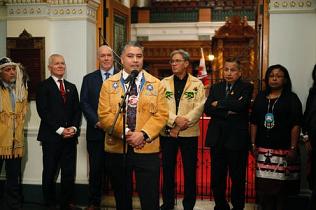B.C. takes historic steps towards the rights of Indigenous Peoples, but the hard work is yet to come
British Columbia recently introduced groundbreaking provincial legislation to implement global standards for upholding the rights of Indigenous Peoples. Those rights are set out in the United Nations Declaration on the Rights of Indigenous Peoples.
At the time, Grand Chief Stewart Phillip of the Union of B.C. Indian Chiefs called it such a positive development that he wondered if he might be asleep and dreaming it all up.
I had the honour of being in the legislature when the Bill 41 was introduced and fully share Grand Chief Phillip’s sense of elation, pride and, yes, a certain amount of disbelief. It’s impossible to overstate the importance of this historic achievement – or the exhilaration over how far we’ve come.
The UN Declaration is the most comprehensive international human rights instrument setting out the inherent rights of Indigenous Peoples and the obligations of governments to honour, protect and fulfil those rights. Implementation of the UN Declaration is at the heart of the Truth and Reconciliation Commission’s 94 Calls to Action.
With the introduction of Bill 41, B.C. is on track to become the first government in Canada – and indeed anywhere in the English common-law world – to establish a legislative framework for putting the declaration’s human rights standards into concrete practice. In doing so, B.C. is not only making an important step toward reconciliation, it is setting an example for the rest of Canada and the rest of the world to follow.
Now comes the hard part: maintaining the courage of its convictions and fulfilling the promise of implementation.
Implementation of Bill 41
In some quarters, any talk of actually upholding the UN Declaration will spur anxiety and opposition. Readers may be familiar with the fact that Bill 41 is based on proposed federal legislation. Romeo Saganash’s private members bill, Bill C-262, died in the Senate in June 2019 after the delaying tactics of a handful of Conservative senators prevented it coming to a final vote.
Concerns over the implications of the UN Declaration have also popped up from time to time in B.C. media.
Speaking to the legislature after the bill was introduced, Cheryl Casimir, of the First Nations Summit, joked: “Did you hear that? The sky didn’t fall.”
I agree wholeheartedly. As someone who has intensively studied the UN Declaration, its content, its history and the work of Indigenous Peoples around the world to bring its provisions to life, I can say without hesitation that the fears and anxiety that have been stirred up around implementation are overblown and unwarranted.





